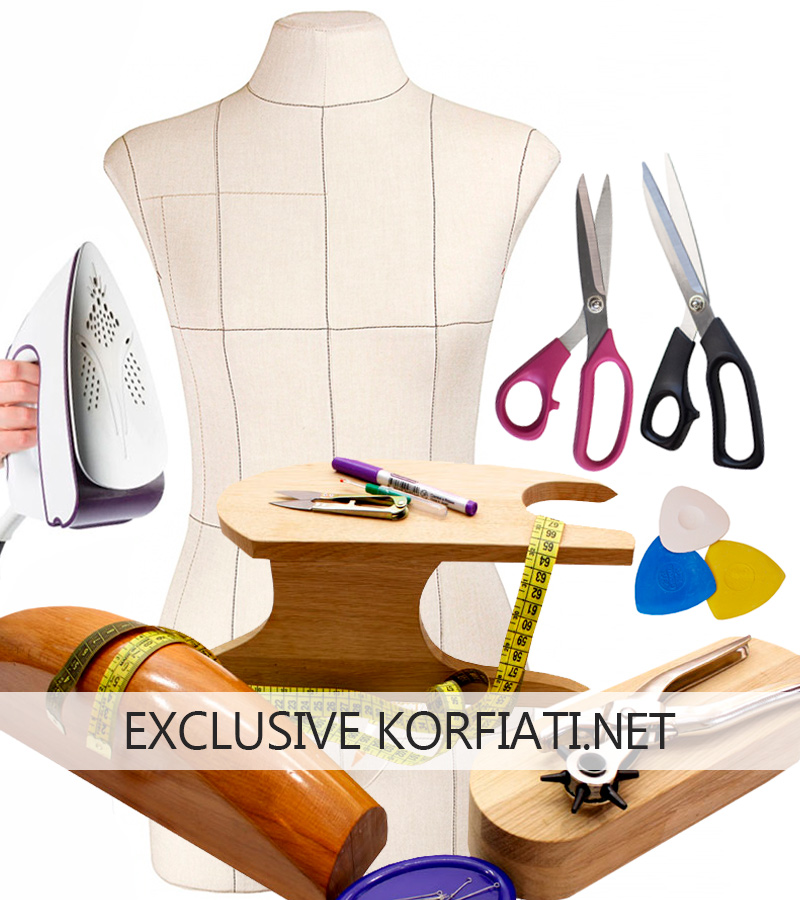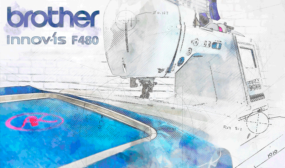Sewing Tools for Perfect Result!
The professional Sewing Tools and Equipment arsenal are very large. However, there is no need to buy all the tools at once. It is enough to have in your kit the required minimum of sewing tools. Many things, for example, sewing thread, needles and scissors, are in every home. What other tools does a tailor need for a perfect result? We will talk about this in the article.
A tape measure
For taking measurements, use a flexible double-sided measure tape that starts from zero on both sides (pic. 1). Some Tape Measures have inch marks on one side and centimeters / millimeters on the other side (pic. 2).
To contents ▴Tailor’s chalk
Use tailor’s chalk to copy the outline pattern details onto the fabric. It is flat and can be of different shapes – triangular or square. sharpen the chalk on both sides at a slight angle with a knife or scissors, the lines will be thin.
To contents ▴Pins for fabric
Use pins to fix the paper patterns on the fabric and then cut it out. For fine fabrics, it is best to use metal pins with a perfect end. Fur parts can be connected by the long pins with plastic tips.
To contents ▴Pincushions
You can store pins in different ways – for example, on a soft Pincushion-pear stuffed with padding polyester (Pic. 1). Such pincushion has weights at the bottom, which allows it to always remain in an upright position. The magnetic Pincushion is very easy collect pins that are scattered on the table (Pic. 2). The wristband for pins and needles allows you to keep hands free when you try on or fit to the figure. The pincushion wraps around the wrist and fastens with Velcro (Pic. 3).
To contents ▴Hand Sewing Needles
Hand Sewing Needles must be of high quality. Get needles set in a variety of sizes and lengths. Use thinner needles for lightweight fabrics, thicker needles for medium to high weight fabrics.
To contents ▴Machine needles
The quality of clothing depends not only on the tailor skills, but also on the quality of the machine stitches. A dull needle can ruin the seam – it will be uneven and wrinkled. That is why it is so important to choose the quality needle for your seing machine. Check the needle quality before every sewing project. The needle marker must match the characteristics of the material. Use a needle for stretch, jersey, leather, jeans, etc. Change the needle with a new one if necessary.
To contents ▴Seam Ripper/ Ripper for loops
You can cut buttonholes and remove uneven machine seams with a ripper even on delicate fabrics. Put the ripper under the stitch and cut the stitches 1 cm apart, then carefully remove the bobbin thread.
To cut through the buttonhole, hold a pin perpendicular to the buttonhole just below the bartack. Cut the buttonhole between the pins. The pin will limit the the buttonhole length and the ripper will not cut the bartack.
To contents ▴Tailor’s scissors
Typically, each tailor has several scissors that he uses depending on the fabric quality. Tailor’s scissors have straight blades and angled handles. Due to this arrangement of the handles during cutting, the fabric does not rise from the table, and the seamstress’s hand does not go beyond the cutting plane. The quality of the cuts depends on the quality of the scissors. That’s why it is important to choose tailor’s scissors that are comfortable to hold in the hand.
To contents ▴Snipper
Snipper is a great tool with which you can very easily cut the ends of the threads. Its secret is that it is constantly cocked and ready for work.
To contents ▴Ironing system or iron
Craftswomen cannot sew clothes without an iron or a ironing system. The main difference between a steam station and a conventional iron with a steamer is that the water tank is located separately. Water in the form of steam is supplied under pressure to the iron. Steam allows you to iron the seams and details of the garment very efficiently. Unlike an iron, the water tanks have a volume of about 1.5 liters, which greatly simplifies the work and excludes frequent refilling of the tank.
To contents ▴Tailor’s boards
There are syper-useful tools for sewing – tailor’s boards and presses. These gadgets not only allow tailors to improve the quality of tailoring, but also greatly simplify life)).
Tailor’s board has many surfaces of different shapes and allows you to iron sleeves, collars, relief seams. The boards must be made of wood – beech or oak and not have external fixings.
To contents ▴Tailor’s mannequin
The tailor’s mannequin will allow you to create high-quality, beautiful and perfectly “fitting” clothes. Look for a fixed-size mannequin made of polymer material – rigid or elastic, into which pins and needles can easily be injected. Pay attention – the removable cover is an important nuance. It can be easily removed and cleaned if necessary.
You might be interested in:
- Women’s Measurements Charts
- Basic straight skirt
- Ease allowance of garments
- Longsleeve – simple sewing pattern






















Do you have a pattern to make a tailors board please…or know where I can get one from?
Unfortunately, we do not have a drawing of the tailor’s board.